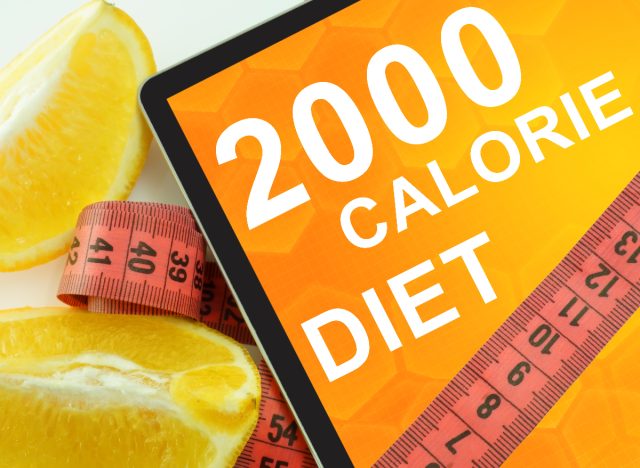Trying To Lose Weight on a 2,000-Calorie Diet? Here's Why That May Not Work

What's your meal and diet plan? A 2,000-calorie-per-day diet seems to be the norm for most people, and according to WebMD, it's based on The United States Department of Agriculture's (USDA) daily recommended requirements. The USDA surveyed the number of calories most individuals eat, and it was revealed that men consume between 2,000 to 3,000 per day, and for women, the range is anywhere from 1,600 to 2,200 calories. This information gathered is what coined a 2,000-calorie diet as a standard guideline. But in reality, that number of calories is not the end-all point of reference. So, if you're limiting yourself to a 2,000-calories-a-day diet, you may want to re-think whether that amount is right for your body and habits. Keep reading to learn why trying to lose weight on a 2,000-calorie diet may not work.
There's really no "standard number of daily calories," an expert says.

According to Joseph St. Pierre, DO, Hartford HealthCare bariatric specialist, "In truth, there is no standard number of daily calories. Everyone's number is different." The survey data that determined the daily recommended amount back in the 90s actually indicated a higher calorie average of 2,400 calories, but 2,000 reigned supreme because advocators reasoned it was better to consume fewer calories than to over-eat, according to Hartford HealthCare.
Dr. St. Pierre commented on the 2,000-calorie benchmark, explaining, "It was essentially a compromise number that is nice and rounded, which puts into perspective how badly we have managed calories and serving sizes as a society."
Although less is usually more when it comes to eating healthy, every person is different as far as dietary requirements are concerned. Examples of daily calories are as follows. An individual who weighs 130 pounds and is 4'11" tall may require 1,500 calories. Many factors would need to be considered, however, such as genetics, daily lifestyle habits, and more. To the contrary, someone weighing in at 350 pounds who is 7'2" tall may need closer to 3,000 calories each day. So placing yourself at a 2,000-calorie limit every day is more likely suited for a small percentage of individuals, and there goes the generalized "2,000 calories a day" rule!
The bottom line? Consuming 2,000 calories per day is used as the standard guideline, but the total is based on the approximate needs of adults, via the official 2020—2025 Dietary Guidelines for Americans, Healthline reports. This total is used as a point of reference on nutrition labels, which state, "Percent Daily Values are based on a 2,000-calorie diet. Your Daily Values may be higher or lower depending on your calorie needs," as per the Food and Drug Administration (FDA).
All calories aren't created equally.
One interesting point to keep in mind is that all calories aren't created equally. "Certain foods lead to weight gain than others, even when they contain the same amount of calories. Just looking at calories can give you an incomplete picture," Dr. St. Pierre explained.
It's always a smart idea to speak with your healthcare professional to learn the right amount of calories your body needs based on your size, shape, and lifestyle. Whether or not you exercise each day plays a big part in this number. "The safest and most sustainable way to achieve your nutrition goals is to involve an expert," Dr. St. Pierre says, adding, "There's so much misinformation out there. We can make sure you're on a path that will actually have a long-term impact—and that's right for you."
Be mindful of the nutritional value of the items you put into your shopping cart (and your belly).

Know what you're buying, including the ingredients and nutritional value of the items you choose. Regardless of how many calories you limit yourself to each day, the majority of them should be healthy ones. According to WebMD, it's important to include dark green, orange, and red vegetables; lentils, peas, and beans; and a few starchy veggies, too. Stay away from saturated fats, empty calories, additional sugar, and sodium.








